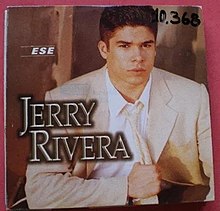
Jerry Rivera is a Puerto Rican salsa singer and songwriter.
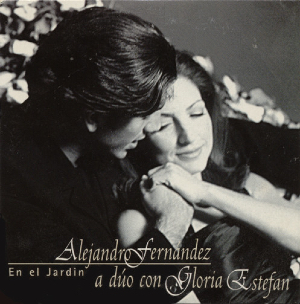
"En El Jardín" is a song written by Kike Santander and performed by Mexican recording artist Alejandro Fernández. It was co-produced by Santander and Emilio Estefan and features Cuban-American singer Gloria Estefan. It was released as the second single from Me Estoy Enamorando by Sony Music Mexico in 1997. The song is a pop ballad and portrays both singers falling in love, as if the love blossomed from a garden. A music video featuring both artists was made for the track.

"Miente" is a song by Spanish singer Enrique Iglesias from his second studio album, Vivir (1997). The song was written and produced by Rafael Pérez-Botija. It was released as the third single from the album in 1997. An uptempo pop power ballad backed by a piano and percussion, the song deals with the singer being in denial about a relationship ending.

"El Amor" is a song by Puerto Rican singer Tito El Bambino. It was composed by Tito and Joan Ortiz and released on February 9, 2009, as the second single from his third studio album, El Patrón (2009). The song blends the sounds of Latin pop with cumbia and merengue. A regional Mexican and a salsa version were recorded and included on the special edition of the album.
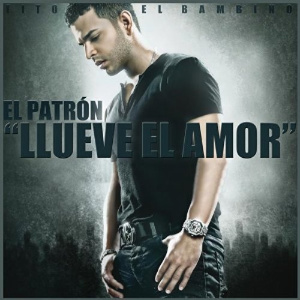
"Llueve el amor" is a song by Puerto Rican singer-songwriter Tito El Bambino. It was released as the first single on November 26, 2010, from the album, El Patrón: Invencible (2011). The Banda version of the song is also in his album which features Banda El Recodo. The theme was used for the opening sequence of the telenovela Eva Luna.
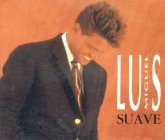
"Suave" (transl. "Smooth") is a song by Mexican singer Luis Miguel from his ninth studio album, Aries (1993). The song was composed by Kiko Cibrian and Orlando Castro with the former handling its production along with the artist. It is a dance number in which the singer describes a woman who bewitches him and becomes the woman of his dreams. The song received positive reactions from two music critics. It was acknowledged as an award-winning song at the 1995 Broadcast Music Inc. (BMI) Latin Awards. Commercially, the song reached number nine on the Billboard Hot Latin Songs chart in the United States. Its music video was directed by Kiko Guerrero and filmed in Acapulco, Mexico, and features Miguel dancing in a beach with several women.

"Si Tú Supieras" is a song written by Kike Santander and performed by Mexican recording artist Alejandro Fernández. It was co-produced by Santander and Emilio Estefan and was released as the first single from Me Estoy Enamorando by Sony Music Mexico on 18 August 1997. The song is a bolero-pop ballad with ranchera influences and portrays the singer yearning for his lover to know how much she means to him. A music video was made for the track and was used as the main theme for the Mexican telenovela María Isabel.

"No Sé Olvidar" is a song written by Kike Santander and performed by Mexican recording artist Alejandro Fernández. It was co-produced by Santander and Emilio Estefan and was released as the third single from Me Estoy Enamorando by Sony Music Mexico in 1997. The song is a bolero-pop ballad with ranchera influences and portrays the singer desperately trying to forget his lover. A music video was made for the track which features Fernández hopelessly attempting to not remember his lover only to slowly delve into insanity. It received a nomination for Video of the Year at the 1998 Lo Nuestro Awards.

"Yo Nací Para Amarte" is a song written by Kike Santander and performed by Mexican recording artist Alejandro Fernández. It was co-produced by Santander and Emilio Estefan and was released as the fourth and final single by Sony Music Mexico from Me Estoy Enamorando in 1998. The song is a bolero-pop ballad with ranchera influences and portrays the singer confessing his love which he admits "goes beyond reason".
"Por Ese Hombre" is a song originally recorded by Argentine duo Pimpinela and Spanish singer Dyango for the former's fifth studio album, Lucía y Joaquín (1985). It was covered by American singer Brenda K. Starr and Puerto Rican singers Tito Nieves and Victor Manuelle, as the lead single for Starr's seventh studio album, Temptation (2002). Mexican singer Ana Bárbara and Mexican band La Original Banda El Limón also recorded the song for Bárbara's eleventh studio album, Yo Soy La Mujer (2014).
"En las Nubes" is a song written by Gustavo Márquez and first performed by Mexican ballad singer Tito Livio on his studio album Fíjate de Mi (1993). It was covered by Puerto Rican salsa singer Jerry Rivera on his fourth studio Cara de Niño(1993). Another salsa cover version of the song was recorded by American musician Edgar Joel on his studio album Me Atrapa la Noche (1994) with Anthony Colón providing the lead vocals for the song. Joel's version reached number-one on the Billboard Tropical Airplay chart. His cover was recognized as the best-performing song of the year at the 1995 ASCAP Latin Awards. Puerto Rican singer Julián singer covered it on his studio Siete Mañanas (1995). Julián's version peaked at number ten on the Latin Pop Airplay chart.
"Una y Mil Veces" is a written by Cuban singer-songwriter Donato Póveda and performed by Mexican singer-songwriter Cristian Castro on his fourth studio album El Deseo de Oír Tu Voz (1996). The song received airplay on Latin pop radio stations in the United States and peaked at No. 17 on the Billboard Latin Pop Airplay chart. It was later covered by Puerto Rican salsa singer Jerry Rivera on his sixth studio album Fresco also released in 1996. Rivera's version peaked at No. 1 on the Tropical Airplay chart, becoming his third number one song on the chart. Rivera's version was recognized as one of the best-performing songs of the year at the 1997 ASCAP Latin Awards on the tropical field.

"Loco de Amor" is a song by Puerto Rican singer Jerry Rivera from his seventh studio album Fresco, (1996). The song was written by Mary Lauret and produced by Sergio George and Cuto Soto. It is a salsa tune, in which Rivera confesses that he is crazy in love. The song received positive from music critics, being identified by them as a standout from the album. It was nominated for the Tropical Song of the Year award at the 9th Annual Lo Nuestro Awards in 1997 and was a recipient of the ASCAP Latin Award in the tropical field in the same year. In the United States, "Loco de Amor" reached number 11 on the Billboard Hot Latin Songs chart and topped the Tropical Airplay chart, spending eight weeks at this position on the latter chart. A music video for the song was filmed in a barn.

"No Quiero Na' Regala'o" is a song by Puerto Rican salsa band El Gran Combo de Puerto Rico from their studio album De Punta a Punta (1971). Written by Perín Vasquez, it deals with the singer not wanting love merely out of pity.

"Dile a Ella" is a song written by Gil Francisco and performed by Puerto Rican salsa singer Víctor Manuelle on his fourth studio album A Pesar de Todo (1997). It was released as the lead single from the album. In the song, the singer asks his friend to tell a woman that he loved that he cannot forget her. It became his third #1 hit on the Tropical Airplay chart and spent nine weeks week on top, making it the longest-running tropical song of 1997. José A. Estévez, Jr. called it a tune that "bristles with uninhibited energy". Paul Verna of Billboard cited the song as one of the album's "amorous ditties". "Dile a Ella" was also listed on Billboard's "Best 15 Salsa Songs Ever". "Dile a Ella" won a BMI Latin Award in 1999.
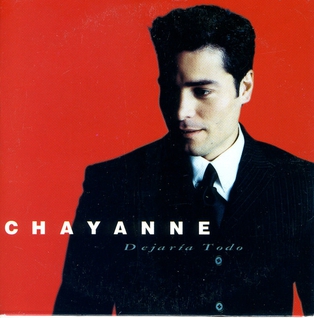
"Dejaría Todo" is a song by Puerto Rican singer Chayanne from his ninth studio album, Atado a Tu Amor (1998). The song was written and produced by Estéfano and released as the lead single from the album in September 1998 by Sony Discos.The rock ballad details everything the singer is capable of doing for his lover. The song received generally positive reactions from music critics and is listed among Chayanne's best songs. A music video for the song was filmed and features a dark scenery. Commercially, it topped the Billboard Hot Latin Songs and Latin Pop Airplay charts in the United States. The track was nominated for Pop Song of the Year at the 11th Lo Nuestro Awards and Song of the Year at the inaugural Ritmo Latino Music Awards in 1999 and was acknowledged as an award-winning song at the 2000 Broadcast Music, Inc. (BMI) Latin Awards.
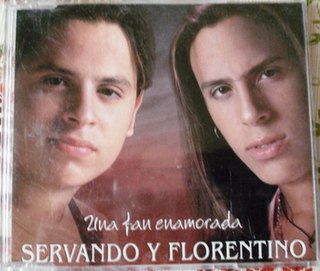
"Una Fan Enamorada" is a song by Venezuelan duo Servando & Florentino from their debut album Los Primera (1997). It was written by Venezuelan musician Ricardo Montaner and released as the album's lead single in 1997. The song was recorded in salsa and ballad. It speaks of a "direct intimacy and understanding to every smitten fan who pined for the guys". Diana Raquel of La Prensa praised as a "catchy song where the voices of Servando and Florentino are heard in perfect harmony." The Miami Herald critic Eliseo Cardona was less impressed with the track, stating it should only be listed to once as it has "the same plot of a Venevision soap opera". "Una Fan Enamorada" served as the closing theme for the Venezuelan telenovela Todo por tu amor (1997). "Una Fan Enamorada" was nominated in the category of Tropical Song of the Year at the 11th Annual Lo Nuestro Awards, but lost to "Suavemente" by Elvis Crespo.
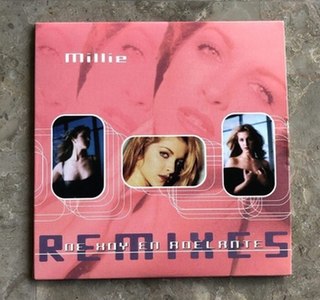
"De Hoy en Adelante" is a song by Puerto Rican singer Millie Corretjer from her third studio album, Amar Es un Juego (1999). It was released as the second single in 1999 and became her second #1 on the Latin Pop Airplay chart and her first on the Hot Latin Songs chart in the US. El Norte Deborah Davis favorably compared it to Cher stating that the artist "taps into the rich vein that has served Cher so well in recent months: emotionally surviving marital disasters. So if you're a woman looking for another battle hymn, turn to Millie ASAP." El Nuevo Herald's Eliseo Cardona cited it as one of the tracks where Corretjer as the "plate having salvageable parts" on the album. It was recognized as one of the best-performing songs of the year at the ASCAP Latin Awards under the pop/ballad category in 2000.
"Que Alguien Me Diga" is a song by Puerto Rican singer Gilberto Santa Rosa from his 12th studio album, Expresión (1999). It was written by Omar Alfanno with José Lugo and the artist handling its production. It is a salsa track in which the singer is searching for unconditional love. Santa Rosa would later record a ballad version. An accompanying music video features the singer in a dark room surrounded by female musicians. Both versions of the song received airplay on Latin radio stations.
